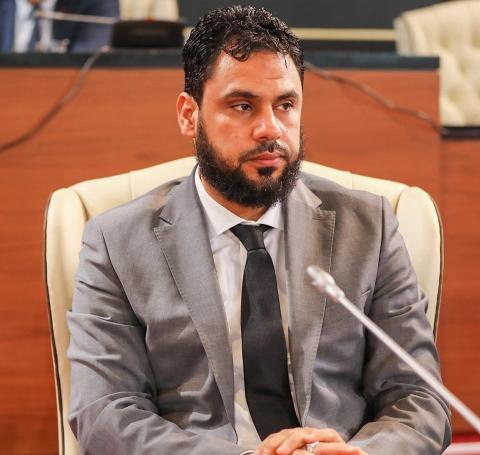
On October 15, 2024, Alkarama submitted a letter to the United Nations (UN) Working Group on Arbitrary Detention regarding the developments in the case of Libyan MP Hassan Farjani Salem.
Salem was sentenced by the Third Chamber of the Permanent Military Court in Tripoli to 10 years and 6 months in prison for allegedly collaborating with members of the "al-Kaniyat" militia in the killing of eight people during an armed attack on the Rawajeh area in Tarhuna in 2017. However, social figures have denied this accusation, stating in a public declaration that Salem had actually worked to end the fighting and mediate peace between the warring parties, contrary to the charge that led to the military court's sentence.
Salem’s family claims that the military court’s ruling was based on confessions obtained under torture and that one of the witnesses had later retracted his testimony. They added that Salem revealed his torture to the military court judge, but the latter ignored his complaints and went on to issue the non-appealable sentence.
On July 10, 2024, Alkarama referred the case of MP Hassan Salem and his brother, Mohamed Salem, to the UN Working Group on Arbitrary Detention. Both were arrested by the Special Deterrence Force (RADAA militia) and are currently being held at Mitiga Airbase, which is controlled by the militia.
Background
On February 27, 2023, shortly after leaving the headquarters of the Administrative Control Authority in Tripoli, Hassan Salem was abducted in broad daylight by the Special Deterrence Force without a warrant or explanation. He was taken to Mitiga, where he was held incommunicado and deprived of contact with the outside world for more than two months.
He was allowed his first family visit only on May 9, 2023. According to his family, they were only granted one more visit, and they lost all contact with him since March 2024. Salem was also denied legal representation until his first court hearing before the Farnaj Military Court on May 22, 2023.
During this session, Salem was informed for the first time of the charges against him, which included "membership in a criminal gang." His lawyer cited his parliamentary immunity, presenting an official letter from the Libyan Parliament requesting his release and asserting that the military court had no jurisdiction to try a civilian. Despite the prosecutor himself requesting his release, the court, under pressure from the militia, ordered that he remain in custody, ultimately leading to his conviction.
The Arrest of Mohamed Salem
On September 31, 2023, Mohamed Salem was arrested by the Special Deterrence Force when he arrived at the Farnaj Military Court to attend his brother’s trial. He was immediately transferred to Mitiga prison, where he was held incommunicado for three months until his first family visit on January 19, 2024.
During the visit, his family reported seeing signs of beatings and injuries on his face and hands. Mohamed Salem was only allowed four visits during his detention, with the last contact taking place at the end of May 2024. His lawyer, appointed by the family, was denied access to him or his case file, as the prosecutor claimed there was no official record of his arrest and that he had not undergone any judicial procedures.
Alkarama's Actions
In light of these egregious violations of the brothers' basic rights, their family had no choice but to appeal to UN experts, requesting their intervention with the Libyan government to secure their release. Alkarama’s submission highlighted that the detention of the two brothers lacked any legal basis and violated not only international law but also Libyan law.
Alkarama detailed all the abuses the two brothers had suffered since their arrest and called on the independent experts of the Working Group to recognize the arbitrary nature of their detention.
State Responsibility for the RADAA Militia's Violations
In previous similar cases, Alkarama has called on the Working Group to acknowledge the Libyan government's responsibility for the actions of the RADAA militia. Despite the militia’s independent command structure, it falls under the authority of the Ministry of Interior and the Attorney General’s office and receives government funding, making the state fully accountable for its actions. Independent experts have regularly urged the Libyan government to ensure that militias and all informal detention centers are brought under its effective control.
